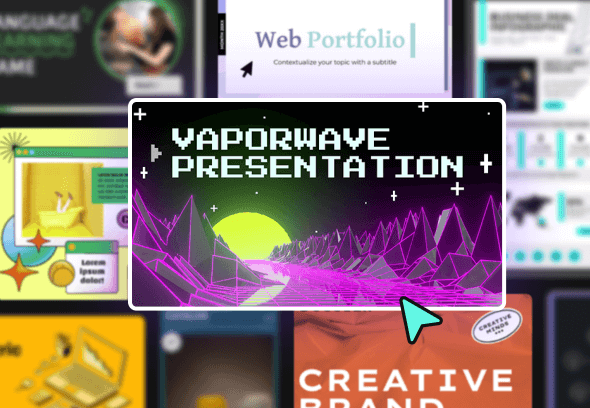What is Genially?
Genially is a cloud-based platform for building interactive learning and communication experiences.
Product Overview
Explore Genially's authoring and content creation features.

What's New
Discover our latest product updates and releases.

Discover how teams use Genially for eLearning, Marketing, and Communications.
K12 Schools
Explore how teachers use Genially to bring interactive learning to the classroom.
Higher Education
Discover how Learning Design teams and Faculty use Genially to build interactive courses.
Contact Sales
START CREATING
Build interactive images
Discover how to make interactive visuals and graphics.
Create interactive slides
Engage your audience with interactive slides and presentations.
Make interactive infographics
Learn how to design interactive data visualizations and diagrams.
More formats
From resumes to reports, make any kind of content interactive.
eLearning templates
Interactive resources for eLearning and corporate training courses.
K12 teaching templates
Interactive classroom resources for primary and secondary education.
Gamification templates
Escape games, quizzes, and other game-based learning activities.
Marketing templates
Interactive microsites, brochures, videos, and branding materials.
Explore all Genially templates
Browse over 1,500 pre-built designs. Save time and create professional interactive materials in minutes.

Explore Genially pricing and plans.

Plans for Teachers
Create interactive learning materials and use Genially in class with your students.


Thesis defense presentation templates
Bring your university research to life and impress the examining committee with Genially’s free Thesis Defense Presentation templates. Present your final year project, Master’s thesis, or PhD dissertation with professional interactive slides.
Presentations
Thesis Defense
All presentations
Educational Presentations
Pitch decks

Psychedelic presentation

Minimal presentation mobile

Retro geometric presentation

Decades presentation

Flow higher education thesis

Essential presentation mobile

Basic shapes presentation

Infographic presentation

Modern presentation

Digital projects presentation

Women's presentation

Psychology presentation

Desktop workspace

Ocean presentation

Pollution presentation

Higher education presentation

Justice presentation

Subject presentation

Digital presentation

Visual presentation

Health presentation

Dynamic higher education thesis

Structured higher education thesis

Newspaper presentation

Health higher education thesis

Research project presentation

Balance higher education thesis

Harmony higher education thesis

Academic presentation ii

Agriculture presentation

Color and shapes presentation

Nature presentation

Audio tutorial

Digital higher education presentation

Healthy living presentation
What’s a thesis defense presentation?
As you approach the end of grad or postgrad studies, you’ll probably be required to deliver a thesis defense presentation. This takes place during the final semester and involves speaking about your thesis or dissertation in front of a committee of professors.
The word “defend” might sound intimidating, but it simply means answering questions about your work. Examiners want to see how knowledgeable you are about your field and if you can back up your arguments with solid and original research. Some departments invite students to a pre-defense, which is like a dress rehearsal for the main event.
If you’re defending your doctoral thesis or dissertation, the event will be more formal than at Master’s level. In some universities, this is called a PhD viva, which comes from the Latin viva voce, meaning “by live voice”. Basically, it’s time to speak about the 80 thousand words you’ve written! As well as your supervisor, the panel will usually include visiting academics from other institutions. If it’s an “open defense” it will be open to other students and members of the public.
The format varies between different universities, but a thesis defense usually starts with the candidate delivering a short presentation accompanied by slides. This is followed by a question and answer session with the panel.
How do I design slides for my thesis defense?
The secret to a good thesis defense presentation is a well-designed slide deck. This will act as a visual aid and starting point for the conversation. Structuring your points and illustrating them on the screen will help you present more confidently.
If the prospect of creating a thesis presentation from scratch is daunting, check out Genially’s free thesis defense templates. Each design has been created by professional graphic designers in collaboration with students and academic experts.
Choose from hundreds of examples with preset color palettes and easy-to-edit slides. In a few minutes you can outline the content of your thesis in an impressive visual format. No artistic skills required!
How should I structure a thesis presentation?
When you create a thesis defense presentation, the first thing to remember is that it should be short and concise. There’s no need to rewrite your thesis on the slides. Members of the committee will already be familiar with your work, having read the document prior to the event.
A thesis defense is a conversational, person-to-person event. Examiners don’t want to read large blocks of text on the screen. They want to hear you talking about your research with passion and insight.
With this in mind, your presentation should serve as a starting point or prompt for discussion. Think of your slides as cue cards: use short titles and keywords to remind you of what you want to say.
Make a good first impression by using a professional thesis defense presentation template with a consistent theme and attractive visuals. Go for a calm color palette and neutral style. The aim is to illustrate your points while keeping the committee focused on what you’re saying.
A thesis defense usually begins with an introductory presentation lasting 15 to 20 minutes, followed by discussion time. For a 20 minute presentation we recommend a series of about 10 slides.
Make sure to include an introduction slide or title page that lays out what you’re going to talk about. Next, move on to each part of your thesis. Outline the problem, background and literature review, your research question, methodology and objectives, findings, conclusions, and areas for future research.
A great thesis presentation should provide the panel with a summary of your research. For that reason, try to avoid dumping too much data or information onto your slides. Use Genially’s interactive infographics, diagrams and charts to highlight the most important points in an eye-catching visual format.
When it comes to the big day and defending your thesis, try to keep calm. Take a deep breath, introduce yourself to the committee and let your slides guide you. Your examiners will come armed with a list of questions, so the formal presentation will flow naturally into a Q&A.
How do I make a good final year project presentation?
If you’re an undergrad, you might be required to deliver a final year project presentation or dissertation presentation. It’s less formal than a graduate degree thesis defense, but the format is similar. You will be asked to present your research findings to faculty and peers with the help of slides. Your performance may count towards your final grade when you’re awarded your Bachelor’s degree.
A good presentation for a final year project should start with a title slide. At this point you should introduce your research question and explain why you chose the topic. If it’s a collaborative project, include a slide that introduces your teammates.
The core part of your presentation should cover your methodology, findings, conclusions, and scope for future research. Wrap things up by thanking your contributors and invite your audience to ask questions.
If you’re not sure how to make a final year project presentation, check out Genially’s free presentation slides for students. Choose from hundreds of professional templates that can be customized to any undergraduate or graduate project. With animated graphics and beautiful data visualizations, you can make standout slides in a matter of minutes.
If you’re submitting your presentation to your professor, try including interactive elements. Genially’s presentation builder allows you to embed online data, videos, audio, maps, PDFs, and hyperlinks in your slides. This can be a useful way to provide supporting evidence, sources, and additional documentation.
Templates for everything under the sun ☀️
Sign up to explore 2000+ interactive, animated designs in the Genially Template Gallery.

PhD Dissertation Defense Slides Design: Start
- Tips for designing the slides
- Presentation checklist
- Example slides
- Additional Resources
Purpose of the Guide
This guide was created to help ph.d. students in engineering fields to design dissertation defense presentations. the guide provides 1) tips on how to effectively communicate research, and 2) full presentation examples from ph.d. graduates. the tips on designing effective slides are not restricted to dissertation defense presentations; they can be used in designing other types of presentations such as conference talks, qualification and proposal exams, and technical seminars., the tips and examples are used to help students to design effective presentation. the technical contents in all examples are subject to copyright, please do not replicate. , if you need help in designing your presentation, please contact julie chen ([email protected]) for individual consultation. .
- Example Slides Repository
- Defense slides examples Link to examples dissertation defense slides.
Useful Links
- CIT Thesis and dissertation standards
- Dissertations and Theses @ Carnegie Mellon This link opens in a new window Covers 1920-present. Full text of some dissertations may be available 1997-present. Citations and abstracts of dissertations and theses CMU graduate students have published through UMI Dissertation Publishing. In addition to citations and abstracts, the service provides free access to 24 page previews and the full text in PDF format, when available. In most cases, this will be works published in 1997 forward.
- Communicate your research data Data visualization is very important in communicating your data effectively. Check out these do's and don'ts for designing figures.

Power Point Template and other Resources
- CEE Powerpoint Slide Presentation Template 1
- CEE Powerpoint Slide Presentation Template 2
Source: CEE Department Resources https://www.cmu.edu/cee/resources/index.html
- CMU Powerpoint Slide Template
Source: CMU Marketing and Communications
https://www.cmu.edu/marcom/brand-standards/downloads/index.html
- Use of CMU logos, marks, and Unitmarks
Email me for questions and schedule an appointment

Top 7 tips for your defense presentation
1. show why your study is important, remember, your audience is your committee members, researchers in other fields, and even the general public. you want to convince all of them why you deserve a ph.d. degree. you need to talk about why your study is important to the world. in the engineering field, you also need to talk about how your study is useful. try to discuss why current practice is problematic or not good enough, what needs to be solved, and what the potential benefits will be. , see how dr. posen and dr. malings explained the importance of their studies..
- Carl Malings Defense Slides with Notes
- I. Daniel Posen Defense Slides with Notes
2. Emphasize YOUR contribution
Having a ph.d. means that you have made some novel contributions to the grand field. this is about you and your research. you need to keep emphasizing your contributions throughout your presentation. after talking about what needs to be solved, try to focus on emphasizing the novelty of your work. what problems can be solved using your research outcomes what breakthroughs have you made to the field why are your methods and outcomes outstanding you need to incorporate answers to these questions in your presentation. , be clear what your contributions are in the introduction section; separate what was done by others and what was done by you. , 3. connect your projects into a whole piece of work, you might have been doing multiple projects that are not strongly connected. to figure out how to connect them into a whole piece, use visualizations such as flow charts to convince your audience. the two slides below are two examples. in the first slide, which was presented in the introduction section, the presenter used a flow diagram to show the connection between the three projects. in the second slide, the presenter used key figures and a unique color for each project to show the connection..

- Xiaoju Chen Defense Slides with Notes
4. Tell a good story
The committee members do not necessarily have the same background knowledge as you. plus, there could be researchers from other fields and even the general public in the room. you want to make sure all of your audience can understand as much as possible. focus on the big picture rather than technical details; make sure you use simple language to explain your methods and results. your committee has read your dissertation before your defense, but others have not. , dr. cook and dr. velibeyoglu did a good job explaining their research to everyone. the introduction sessions in their presentations are well designed for this purpose. .
- Laren M. Cook Defense Slides with Notes
- Irem Velibeyoglu Defense with Notes
5. Transition, transition, transition
Use transition slides to connect projects , it's a long presentation with different research projects. you want to use some sort of transition to remind your audience what you have been talking about and what is next. you may use a slide that is designed for this purpose throughout your presentation. , below are two examples. these slides were presented after the introduction section. the presenters used the same slides and highlighted the items for project one to indicate that they were moving on to the first project. throughout the presentation, they used these slides and highlighted different sections to indicate how these projects fit into the whole dissertation. .

You can also use some other indications on your slides, but remember not to make your slides too busy. Below are two examples. In the first example, the presenter used chapter numbers to indicate what he was talking about. In the second example, the presenter used a progress bar with keywords for each chapter as the indicator.

Use transition sentences to connect slides
Remember transition sentences are also important; use them to summarize what you have said and tell your audience what they will expect next. if you keep forgetting the transition sentence, write a note on your presentation. you can either write down a full sentence of what you want to say or some keywords., 6. be brief, put details in backup slides , you won't have time to explain all of the details. if your defense presentation is scheduled for 45 minutes, you can only spend around 10 minutes for each project - that's shorter than a normal research conference presentation focus on the big picture and leave details behind. you can put the details in your backup slides, so you might find them useful when your committee (and other members of the audience) ask questions regarding these details., 7. show your presentation to your advisor and colleagues, make sure to ask your advisor(s) for their comments. they might have a different view on what should be emphasized and what should be elaborated. , you also want to practice at least once in front of your colleagues. they can be your lab mates, people who work in your research group, and/or your friends. they do not have to be experts in your field. ask them to give you some feedback - their comments can be extremely helpful to improve your presentation. , below are some other tips and resources to design your defense presentation. .
- Tips for designing your defense presentation
How important is your presentation, and cookies?

- Next: Tips for designing the slides >>
- Last Updated: Jan 9, 2024 11:18 AM
- URL: https://guides.library.cmu.edu/c.php?g=883178

IMAGES
VIDEO